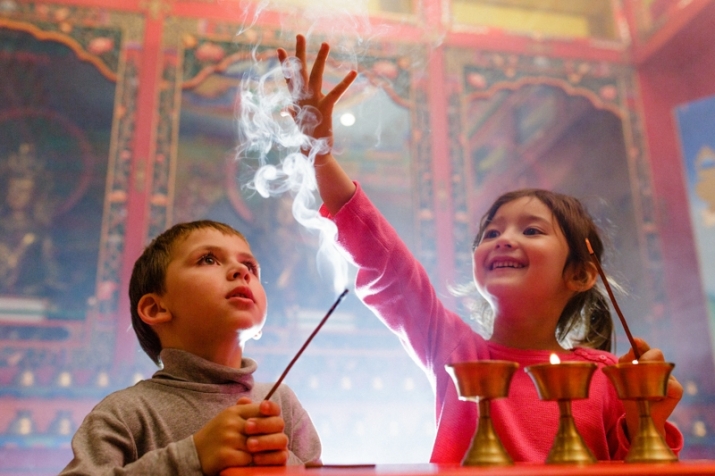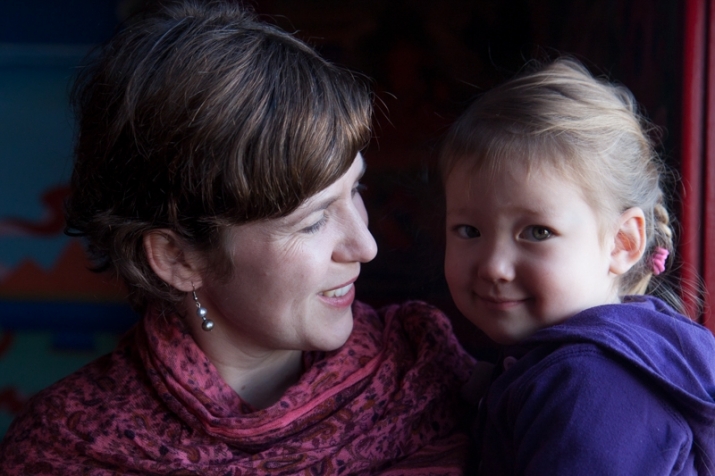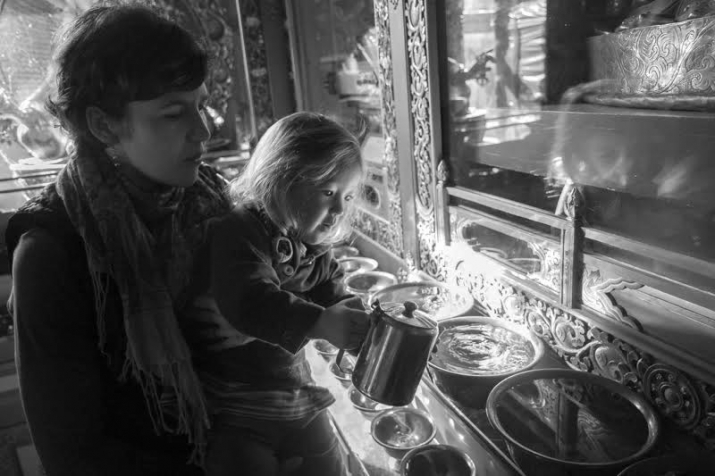Reflections from a Mother on the Path

About This Resource
Details
Reflections from a Mother on the Path
By Summer Adams
This article was originally published on Buddhistdoor Global.
In order to cultivate impartial compassion on the Buddhist path, we contemplate again and again that at some point in time, all beings have been our very own mothers. As a Buddhist teenager and young adult, I knew that it was important to reflect on this, but the idea remained vague—until my first daughter was born, that is. It was late at night when Amaya joined the outside word—a night Tiger in Chinese astrology. I had rubbed butter blessed by one of my teachers all over my belly to ease the pain during labor, and it seemed to help. Amaya was born healthy, and with the strong presence of the Tiger sign.
My husband and I spent the whole night holding her and gazing at her in awe, overcome with the joy that new parents feel. We didn’t sleep a wink, while she slept quietly. During those first moments with Amaya, I realized that my parents had felt this way about me, too. It was a humbling recognition that came with a flood of sweet memories, but also with regret. Even though I have a loving relationship with my mother, in a flash I remembered moments of being dismissive or rude, and winced. In those early hours of the morning, I also came to a new understanding about the significance of all beings having been our mothers at some point in the beginningless cycle of existence.
Being a mother brings overwhelming love, but also an array of other emotions, such as fear that our precious little one will come to some harm. As parents, we are often forced to acknowledge all the uncertainties of this life, wondering if we will meet illness and whether we will have a lifetime together or only a short time. Having a child suddenly opened the door to endless concerns and uncertainties that are a part of life, but on which I had previously not reflected with quite the same intensity. Also, quite suddenly, other people were no longer just individuals that I met or knew but someone’s child, who had been born to and cared for by their mother. Of course this is obvious, but experiencing the joys and pains of parenthood brings new meaning to this fact. Now, when I hear that someone is going through some kind of hardship, I think of their mother and family as well. My contemplation of the teachings on bodhicitta, the motivation to attain enlightenment not only for oneself but for the sake of all beings, has also become richer. Even a very self-centered person like me has somehow softened, and I feel more patient and connected to others. In this way, I believe that becoming a parent has helped me become a more genuine Dharma practitioner. It doesn’t seem acceptable to think that we have had this intimate bond with all other beings and are now mostly oblivious to each other, or worse, even often unkind.
As Amaya and her little sister, Leela, grow, it becomes ever clearer that children come to this life with their own tendencies and characters. Since she was very small, Amaya has had her own definite style (very much inclined to bling); she can be quite aloof, but is also very warm. Leela, now two, has many completely different traits, and when asked to choose a toy to play with will often request a car or a truck. Even though each child has her own way of being, they also mirror our habits as parents and learn from us all the time. In Buddhist practice, we try to pay attention to our habits so as to curb and break the non-virtuous ones and ultimately, to destroy the habit of self-clinging. My little ones have a way of exposing all sorts of bad habits that before had quite escaped my notice, and it is quite painful when I see them mirrored by my girls. I am reminded that the best way to teach others is by example, again and again.
Whether we like it or not, as parents we take on the role of guides for our children, with other activities becoming limited and at times, quite challenging. Retreats and teaching events that I had previously engaged in with ease now require many logistics to even consider joining. And then, once everything is in place, perhaps the babysitter cancels or one of the girls gets a fever. Even if I do make it to the teaching, I can barely concentrate as I wonder if the sitter has remembered to close the gate to the stairs or if I’ve left enough diapers . . . and after the train of anxious thoughts passes, I start nodding off with exhaustion and craving espresso. Sometimes, there seem to be endless frustrations. I have days when I feel like I am failing as a parent and that I am not applying the Buddhist teachings sufficiently. But then I try to step back and remember that suffering is a part of existence and that all aspects of our daily life need to be brought onto the path.
Often when I am with my girls, I notice that instead of enjoying the moment and being engaged with them, I am thinking about all the different tasks or other activities I could be doing, or yearning to spend more time in formal meditation or study. Again, I step back, look at my motivation, and remember to be more present and let them be the focus of my attention. When I see that I have been able to teach the girls to be more kind or to examine their own emotions more carefully, parenting as a Buddhist makes sense. Teaching them to respect other living creatures and to venerate wisdom beings and the representations of wisdom brings such joy. Slowly introducing them to meditation, I also see the benefit that Buddhist parenting can bring to the next generation. It is not easy raising children, but those of us who are devoted to the teachings of the Buddha must think of future generations. If as parents we can consciously incorporate Buddhist truths and ethics into our parenting, the benefit will surely be lasting.
I rejoice when my own and other sangha children participate in the accumulation of merit, such as making offerings and helping others. Even living at a Buddhist center, we find ourselves accumulating boxes of Polly dolls and Peppa Pig merchandise. The act of accumulating objects is so culturally ingrained it takes some effort to encourage the custom of giving and offering. Amaya, Leela, and the other children around delight when invited to join in the offering of butterlamps (a light offering to illuminate the path of all beings) or when requested to collect flowers for the shrine. As we juggle our daily routine of school lunches, brushing teeth, and other mundane tasks, sometimes I forget to encourage these types of activities. However, when the children help prepare the shrine and make offerings, the natural goodness that comes out of it is tangible. It is an inspiration to have the opportunity to encourage them in this way.
Of course, there are days of tantrums and bad moods. A disagreement with a friend at school might make Amaya return home feeling out of sorts. In these moments, I try to emphasize how our emotions and perceptions are constantly changing, and remind Amaya to try to see the other child’s point of view. Also, we talk about similar situations and how they have since changed and passed. I hope to give support but also to lessen self-centered tendencies, and sometimes, though not always, I am able to shift the mood. If our children are encouraged to be self-centered, it will only bring more suffering both to them and those connected with them. I believe that there is not a single Buddhist truth that cannot be introduced to children as they grow. Teachings like impermanence, the law of cause and effect, and impartial love for others resonate deeply in their small but tremendously big hearts.


